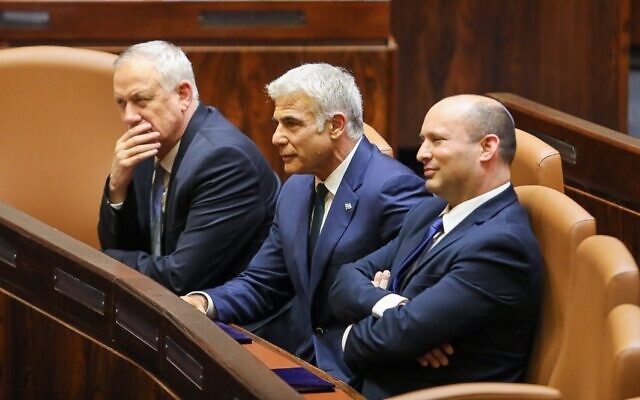FRESH AIR
RESOURCES
Some key points to understand about the dissolution of Israel’s Government
June 22, 2022 | Eliana Chiovetta

Israeli PM Naftali Bennett (R); Alternative PM and Foreign Minister Yair Lapid (C) and Defence Minister Benny Gantz (L) (Photo: Noam Moscowitz / Knesset spokesperson)
- On Monday, June 20, Israeli Prime Minister Naftali Bennett announced he will be introducing a bill to dissolve the Knesset, (Israel’s parliament) and call new elections. If the bill is passed, a general election will be held in late October.
- The bill was initially scheduled for a vote next Monday, but there are reports that it may be voted on as soon as Wednesday, June 22.
- In his press conference on Monday night, Bennett explained his reasons for moving to dissolve the Government, saying “recently we have done everything to preserve this Government, we have turned over every stone… I decided to make the difficult and Zionist move… We managed to establish a good Government for Israel, we got Israel out of the pit.” This statement apparently referred to the political deadlock within Israel, which has had four inconclusive elections in the last three and a half years.
- Bennett and his Government were in office only one year – they were sworn in on June 13, 2021. The Government is a parliamentary coalition consisting of eight different political parties which initially had a narrow majority of only 61 seats in Israel’s 120-seat Knesset. The coalition spanned the political spectrum and included, for the first time, an Arab Islamist party, the Ra’am party led by Mansour Abbas.
- Foreign Minister Yair Lapid of the Yesh Atid party has been Bennett’s main political partner in the outgoing Government and will replace Bennett as interim PM until the election if the dissolution bill passes. This is because of a clause in the coalition agreement stating that in the event of Government collapse caused by the withdrawal of support from within one of the parties in Bennett’s “bloc”, as in this case, Lapid is to become interim PM.
- Lapid will become the country’s fourteenth prime minister if the dissolution bill passes. He will remain in office as interim Prime Minister until a new government with a Knesset majority is formed.
- This dissolution has followed weeks of political frustration within the Government, with numerous MKs threatening to quit. In late April, Idit Silman, a member of Bennett’s own right-wing Yamina party, quit the coalition and joined the opposition. This move left the Government with only 60 seats, equal to the opposition, resulting in an inability to pass legislation.
- The political crisis reached a new height on June 6 when a vote in the Knesset failed to pass a bill renewing regulations that apply Israeli criminal and civil law to Israelis in the West Bank, giving Israeli settlers living there the same rights as citizens in Israel. These regulations need to be renewed every five years and were set to expire on June 30. However, if the Knesset is dissolved before then, the regulations will remain in place until the formation of a new Government.
- A second defector from Bennett’s own Yamina party, MK Nir Orbach, cited the failure to pass the bill, and opposition to it from some members of the coalition, as a reason for jumping ship and leaving the Government with only 59 seats.
- During his Monday night press conference, Bennett cited the inability to pass the bill as a reason for dissolving the Knesset now. He explained that he had held a series of talks on Friday with Israeli security and legal officials about the legal ramifications of the Government’s failure to extend the West Bank regulations. Bennett stated that he realised that allowing the expiration of the law meant the State of Israel would “enter into constitutional chaos… and he could not allow that.”
- The collapse of the Government continues a state of effective political stalemate in Israel that has persisted since December 2018, when a majority Government led by Binyamin Netanyahu collapsed. There have been four elections since then, in April and September 2019, March 2020 and March 2021. Each of these elections ended in effective political deadlock, with little prospect of a stable majority Government. A key cause of that deadlock has been the corruption charges currently being prosecuted against long-serving former Prime Minister and current Opposition Leader Binyamin Netanyahu. These charges caused several potential coalition partners to refuse to serve with Netanyahu until the cases against him were resolved.
- Despite its dissolution after only one year, the current Government can point to some significant political achievements, including passing a state budget in November for the first time in almost four years, lowering unemployment, being the first country to administer COVID-19 boosters, and, in foreign policy, a series of agreements and meetings expanding ties with the UAE, Morocco, Bahrain, Egypt and Jordan in the wake of the 2020 Abraham Accords.
- US President Joe Biden plans to visit Israel before the next election would occur, probably in mid-July. Should the current Government dissolve, Lapid will be the Prime Minister, and thus meet with Biden instead of Bennett.
RELATED ARTICLES

‘Time’s up for talk’: Joel Burnie discusses Antisemitism Envoy’s report on Sky News
Jul 11, 2025 | In the media, Video

‘Optimism’ for Hamas to ‘exile’ their power and create a permanent ceasefire with Israel: Joel Burnie on Sky News
Jun 30, 2025 | Featured, Video

Australian government’s response to Iran-Israel conflict ‘disappointing’: Paul Rubenstein on Sky News
Jun 17, 2025 | Video

UNRWA feeds the ‘Palestinian delusion’ of no Jewish state: Dr Einat Wilf on Sky News
Jun 12, 2025 | Featured, Video



















